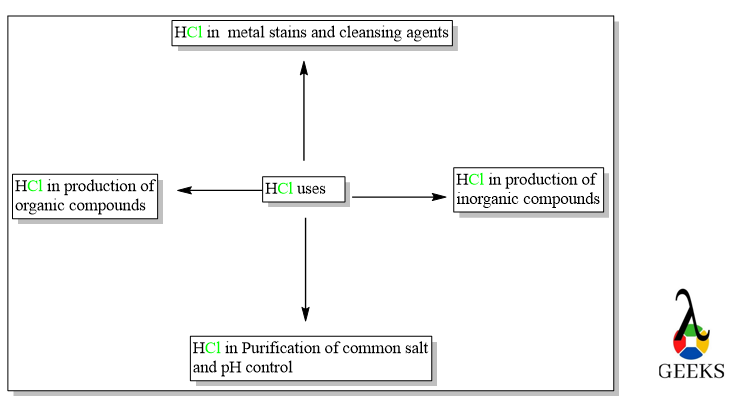Hydrochloric acid (HCl) is called Chlorohydric acid, and it exists in gaseous form, hydrogen chloride gas. Let us see some facts on HCl acid and its uses.
Uses of HCl are
- Purification of common salt
- Production of Organic compounds
- Production of Inorganic compounds
- Cleansing agents
Let us discuss some important facts on Hydrochloric acid and its uses in various fields
HCl uses

purification of common salt and pH control
The manufacture of oil makes use of hydrochloric acid. Typically, rock is injected with hydrochloric acid, and the reactions result in the formation of large-pore structures.
production of Organic compounds
- The manufacture of organic molecules like dichloromethane and vinyl chloride, which are necessary to make PVC, benefits from the usage of HCl.
- Ascorbic acid and other chemical substances, as well as pharmaceuticals, are also produced by HCl.
production of Inorganic compounds
- The creation of substances that serve as water treatment chemicals, HCl helps to remove the cations from the resins during the regeneration of ion-exchange resins.
- HCl in the pickling of steel
- HCl is used to remove rust or iron oxide (Fe2O3) from steel or iron before it is processed in wire manufacturing,
removing metal stains and cleansing agent
- HCl acid is frequently used to remove chemical stains or rust, particularly from metals like iron, copper, and others.
- Tiles in kitchens and bathrooms are frequently cleaned with hydrochloric acid, which also effectively disinfects the area.
- HCl is also utilized in the textile sector.
Precautions while using HCl acid
- Since hydrochloric acid is a harmful liquid, it must be handled carefully.
- HCl Acid is corrosive, and concentrated forms of it emit deadly acidic mists.
- Small amounts of hydrochloric acid can cause irritation and inflammation in the nose, eyes, respiratory tract, and stomach in humans.
Miscellaneous uses of HCl
- In the food, textile, metal, and rubber sectors, hydrogen chloride (HCl) is frequently employed as a bleaching agent to neutralize alkaline substances.
- HCl denatures proteins and alters the pH in the immediate area.
- HCl is a great solvent for metals, various metal oxides, carbonates, and phosphates.
Conclusion
In this article, we have discussed the properties of HCl acid. Its various uses in organic and inorganic chemistry and its equation of formation have been discussed.
Hello……I am Ajay Sharma. I have completed my Master’s degree in Organic chemistry from the Vellore Institute of Technology,
Let us connect on Linkedin-www.linkedin.com/in/ajay-s-62602b1b4